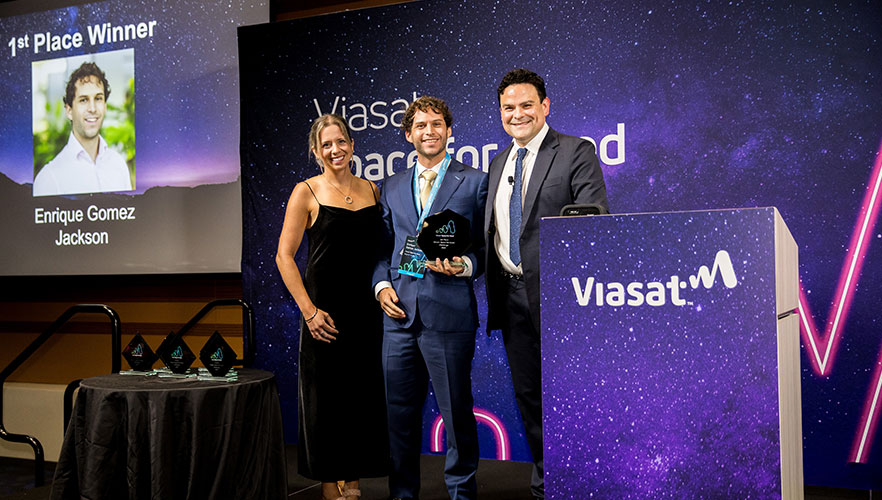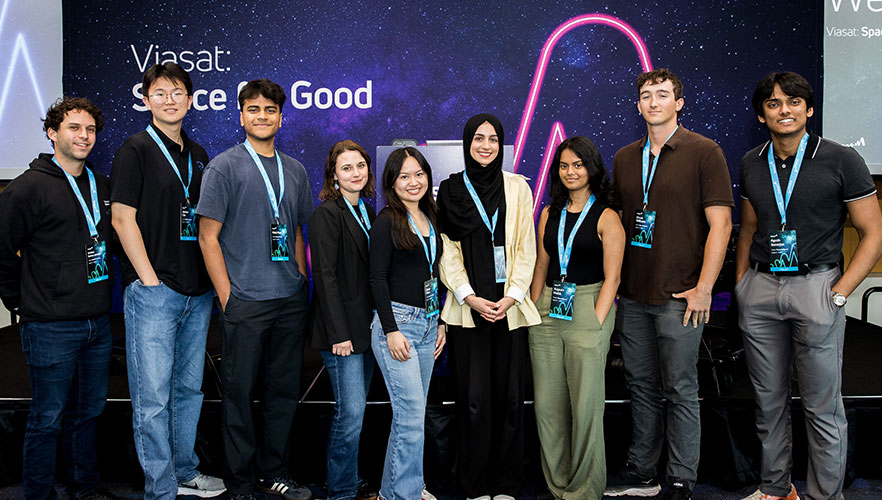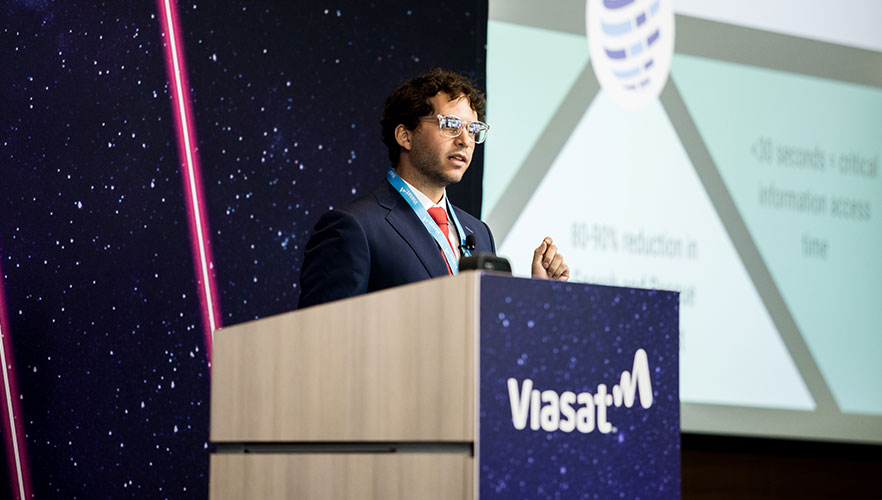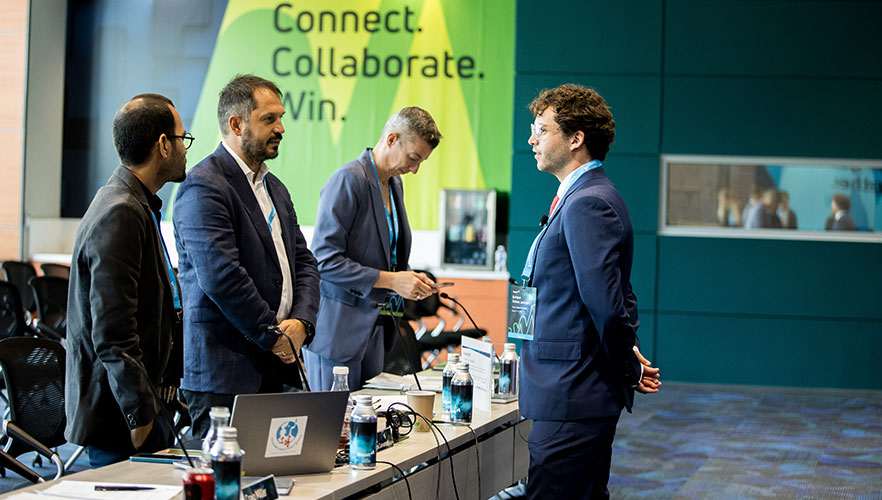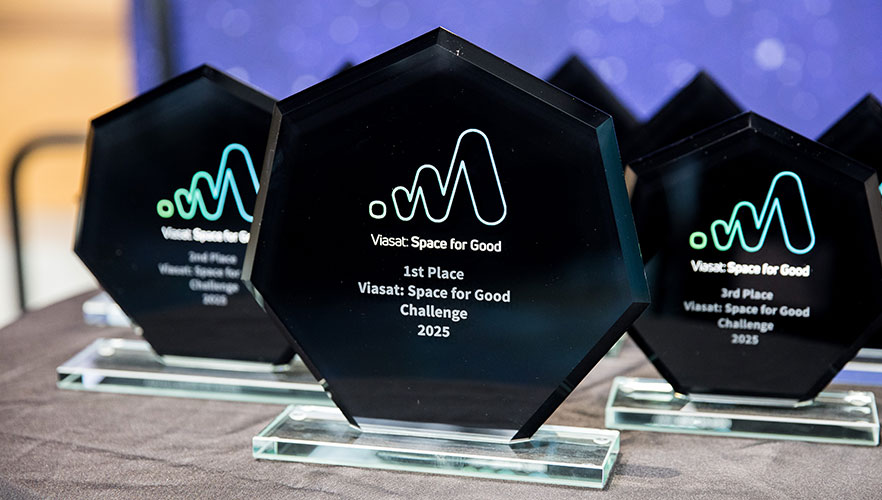UIW Alumnus Wins First Place in 2025 Viasat Space for Good Challenge
Photo credits: Viasat Inc.
This month, Enrique Gómez Jackson ’25 was recognized as the first-place winner for Viasat’s 2025 Space for Good challenge. Viasat, a global technology company specializing in satellite communications, launched their Space for Good challenge welcoming students to pitch projects that seek to “tackle real-world space sustainability problems” for the chance to win cash prizes to fund their idea (viasat.springpod.com). Jackson was one of this year’s many participating applicants, yet it was ultimately his idea that won. The stellar concept, a smart bracelet that helps locate, identify and save lives of those involved in natural disasters, received top recognition and $15,000 in funding.
Jackson named his innovative smart bracelet “Earthlive.” His idea for the bracelet was inspired by capstone research which focused on natural disasters that was conducted by his sister, a ‘24 UIW alumna who studied Biology and Environmental Science. Through their collaboration, they were able to identify a “gap” between victim and emergency responder communications, they sought to bridge the gap through his Earthlive bracelets.
He acknowledges that there are existing technologies that serve similar purposes, but where these technologies often faulter is when there is a lack of connection to WiFi, internet and cellular coverage. These challenges make it difficult for search and rescue operations to take place as they are not certain where victims are located. This lack of connectivity often costs a significant amount of time and money, before rescue workers are even able to establish an estimated location.
“What we're doing is, in a way, taking the search out of the equation,” explained Jackson. “We designed a bracelet that is extremely durable and has a battery that lasts between seven to 10 days. We chose a bracelet because when it’s attached to your wrist, then it is a lot less likely to get lost if an emergency happens and someone requires immediate attention.”
By utilizing device to device (D2D) technology, the bracelet is connected directly to satellites without additional components such as external antennas. As long as there is a clear view of the sky, the bracelet will transmit your location anywhere in the world every 60 seconds; an average of 43,000 transmissions per day. Additionally, the bracelet’s NFC chip can store encrypted personal information such as medical information and emergency contacts, making it easier for emergency providers to accommodate a person’s own personal needs.
Prototypes for his bracelets began production in January of this year, allowing Jackson to step away from theory and actually consider the functional technology necessary for success. He noted that he’s very proud of the current production of the technology, as it has beneficial qualities such as customized boards and hardware that afford the product its smaller size, and the affordability of its materials that make it possible to one day be accessible on a massive scale.
Jackson recalled that he came across Viasat’s Space for Good challenge by chance and applied as a then-UIW student after finding the challenge aligned well with his invention. He soon found himself going through the competition’s phase one, phase two, all the way to being chosen as one of the competition’s nine finalists. He traveled to Carlsbad, California this August to present the Earthlive bracelets to a panel of judges consisting of Viasat leaderships and technological specialists.
Before presenting, Viasat assigns finalists a Viasat mentor to help them polish their project presentations. Tyler Hoffman, Viasat mechanical engineer, mentored Jackson as someone who has developed similar technology. Jackson noted that Hoffman was immensely helpful in considering aspects such as cost projections, design, technology implementation and future development.
“Having someone that is inside the industry that has done this before with similar products and has a lot of expertise in the area was a great experience!” expressed Jackson. “Having similar interests like swimming, serving others and mechanical engineering made it really easy to work with him and learn from him.”
The day of his presentation, Jackson impressed the judges, ultimately leading him to his first-place win! Jackson felt gratitude for this honor. He knows he went up against impressive competitors from across the nation. To have Earthlive picked, he felt affirmation for the quality of his idea, and pride in the amount of work it had taken to get to this point.
“Enrique had a fantastic idea with Earthlive and was eager to understand how satellite technology and Viasat’s cutting-edge innovations could take his idea to the next level,” shared Hoffman. “It was immensely rewarding to introduce Enrique to the world of satellite communications, product design and development, and then watch him embrace these concepts and elevate his idea into an award-winning presentation. I am so proud of Enrique for all the hard work he put into the program. It was an unforgettable experience.”
Jackson expressed his gratitude to the competition’s organizers, his sister, family, his UIW professors who mentored and supported him, as they helped him to achieve this accomplishment.
Jackson says he now looks forward to garnering more attention for Earthlive and to further developing the bracelets so that production can begin, making Earthlive available for the benefit of the public it’s intended to serve.
“We're not building it (Earthlive) in a way that only the top 1% can access it,” noted Jackson. “We're building it so that everyone can have it because the idea is to save as many lives as possible.”
Congratulations, Enrique Gómez Jackson!
Click here to read Viasat’s press release on this year’s Space for Good winners.


